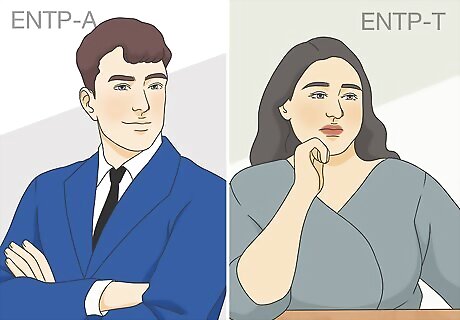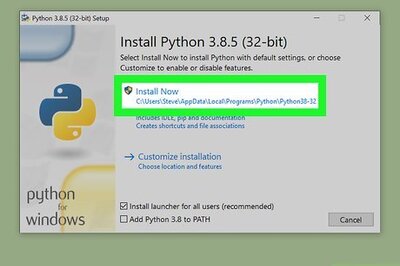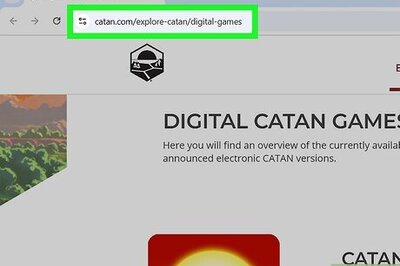
views
X
Research source
The subtype ENTP-T (the “Turbulent Debater”) is even less common and has unique traits and skills compared to the average ENTP or Assertive ENTP (ENTP-A). In this article, we’ll break down what makes an ENTP-T different from ENTPs and ENTP-As, what general traits they all have in common, and the best compatibility matches and careers for ENTP-Ts.
- Turbulent ENTPs (ENTP-Ts) are more laid back, introverted, and in tune with their emotions than ENTPs or Assertive ENTPs (ENTP-As).
- ENTP-Ts exhibit similar key traits of ENTPs like outspokenness, enjoying a good debate, flexibility, and good social skills.
- ENTP-Ts are most romantically compatible with INFJ-As and INTJ-As, as well as other introverted or assertive personality types.
ENTP-T Personality Overview

ENTP-Ts are called Turbulent Debaters, Visionaries, or Innovators. “ENTP” is a Myers-Briggs Type Indicator (MBTI) code, or one of the 16 personalities. In general, ENTPs are creative, intelligent, and enjoy debating or verbal sparring (hence the name “Debater”). They’re fairly outspoken, yet they’re flexible and enjoy interacting with a wide variety of people. The add-on “-T” comes from the personality index website 16 Personalities to further refine the MBTI personalities and indicates a personality that’s insecure about their abilities or successes. Here’s a full breakdown of the ENTP-T code: Extraverted (E): ENTPs “recharge” by being around other people and get energy from the external world (although ENTP-Ts tend to be more like introverted extroverts). Intuitive (N): ENTPs learn by looking at the big picture and seeing how information is connected rather than thinking linearly or only going off of “the facts.” Thinking (T): ENTPs make logical, rational decisions based on pros and cons instead of letting their feelings or relationships take control. Perceiving (P): ENTPs crave flexibility and work on their own schedule based on what they perceive around them rather than sticking to a rigid plan. Turbulent (T): Turbulent ENTPs (ENTP-Ts) are driven by success and perfectionism to counterbalance their self-doubt or imperfections. This is in contrast to Assertive ENTPs (ENTP-As) who are more self-assured and confident.
ENTP-T vs. ENTP-A Personalities

ENTP-Ts are more laid back and introverted than ENTPs or ENTP-As. You might call them “introverted extroverts” since they enjoy socializing, but need lots of alone time to pursue their many interests. They also tend to be more relaxed and ruffle less feathers than their ENTP or ENTP-A counterparts because they’re more in touch with their emotions. They can easily identify feelings like anxiety or anger and respond to them in a healthy way, while ENTPs or ENTP-As might ignore or distract themselves from unpleasant emotions. On the down side, ENTP-Ts are more prone to people-pleasing and worrying about their image (physically, professionally, or intellectually) than ENTP-As. They may also have a harder time dealing with stress and can feel discouraged more easily than ENTP-As, who are generally more self-assured. Like other turbulent personality types, ENTP-Ts seek approval from others and may feel insecure about their skills and abilities without external validation.

Assertive ENTPs are highly confident and have good coping skills. ENTP-As get their validation from within and have no problem celebrating their successes without doubting themselves. They’re less concerned about making mistakes or people-pleasing than ENTP-Ts because they have higher self-trust and believe mistakes help them grow (it helps that they often believe they’re unlikely to make a mistake in the first place). ENTP-As are also more stress-resistant than ENTP-Ts. They overthink and worry less about outcomes because of their assertive, “everything will be fine” mindset. On the down side, an ENTP-A’s confidence can border on arrogance or intolerance. They may blame others for their mistakes or shut down ideas and proposals that don’t gel with their own point of view. ENTP-As are more rigid than ENTPs or ENTP-Ts. They lose focus over things that don’t interest them and might have a “my way or the highway” approach to getting things done.

The Assertive-Turbulent scale reveals your confidence in your abilities. It defines how someone might react to success and failure, unknown situations, or criticism and feedback. Assertive personalities are confident in themselves, decisive, and handle stress well, while Turbulent personalities are more insecure and perfectionistic, sensitive to others, and strive for external validation. While it may sound like Assertive personalities have an edge over Turbulent ones, both types have their pros and cons: Assertive personalities may be confident to the point of over-confidence or arrogance. They might neglect potential problems or gloss over errors that a Turbulent personality wouldn’t miss, leading to larger-scale failures down the road. Turbulent personalities’ self-doubt can inspire them to constantly improve themselves and hone their skills, making them high-achievers. They’re more proactive than their Assertive counterparts and can be highly valuable collaborators and team members.
ENTP General Personality Strengths

Natural leader ENTPs generally lead by doing or demonstrating rather than giving orders or commands. They’re steadfast in their beliefs and values, and they tend to inspire others to act. They use their resourcefulness, innovative thinking, and enthusiastic communication skills to solve problems creatively. Sometimes, though, they might be too hard on people who seem “unmotivated” to them to try and inspire them to do better. This can backfire and cause others to withdraw rather than amp up their efforts.

Confident In general, ENTPs take criticism well (although ENTP-Ts may be more sensitive to it than ENTP-As). They’re usually self-assured in their ideas, skills, and talents and expect a little bit of opposition on their path to success. Instead of taking pushback very personally, ENTPs might use it as motivation to prove others wrong.

Flexible and adaptable ENTPs may not be agreeable to every person’s ideas (they love to debate, after all), but they generally take a go-with-the-flow approach to big problems or circumstances that pop up at work or in their personal life. They do well in fast-paced or frequently changing environments because they can improvise solutions on-the-spot.

Innovative and visionary ENTPs aren’t afraid to take risks to try something new when they believe there’s a better way to do things. With their intelligence and creativity, they’ll find a way to make any product, procedure, system, or relationship work (even if they have to endure a few failures along the way). Failure is a lesson learned to ENTPs, and they take all of their experience and gained knowledge to fuel their many successes. Specifically, ENTPs enjoy developing strategies to take advantage of new opportunities that arise. For example, they might excel at creating a content calendar for a new social media app to ride the wave of hype around something new.

Outspoken and fans of debate It’s not surprising that the Debater likes to get in a (mostly lighthearted) parley now and then. ENTPs emphasize logic over emotion and use their rationality to debate their positions or get competitive with others. They aren’t afraid to state their opinions, either, and will speak up in just about any circumstance when they disagree with someone or have something to add. Most of the time, ENTPs are debating just because they like it and don’t mean to upset others. Not everyone appreciates this, though, and ENTPs may risk offending someone if they aren’t sensitive to their reactions. This trait can sometimes get an ENTP in hot water in formal or professional situations. For example, getting into an argument with your boss at an important meeting probably doesn’t bode well for your professional relationship.

Good at socializing ENTPs enjoy chatting with and getting to know others. They pick up information quickly and can learn much about a person from just a few short exchanges. They’re generally interested in how other people’s minds work and like to know how others think and view the world.
ENTP General Personality Challenges

Trouble making decisions or being present ENTPs enjoy thinking about the future and the big picture, which can make paying attention to the here and now difficult for them. They may get bored easily or have difficulty focusing, and because they analyze so many options and ways forward, they have trouble making fast or decisive decisions. If you’re an ENFP struggling to be present, consider mindfulness exercises like meditating, journaling, or even yoga and breathing exercises to connect you to the moment. Be more decisive by trusting your rational, logical way of thinking. Consider what’s probable instead of everything that’s possible—you’ll have fewer options to be torn by.

Impracticality caused by a dislike of routine ENTPs can seem chaotic sometimes—they have eyes on the future, so they easily get caught up in their thoughts and ideas and might neglect their routine or immediate tasks like cleaning or paying bills. They dislike routine in general, and they may seem disorganized, untethered, impractical, and aggravating to others who prefer planning and predictability. If this sounds like you, try to change your mindset around rules and structure. While some expectations might seem limiting, the majority of them provide order and comfortable boundaries for groups of people that must work together (including you).

Procrastination or failure to follow through on ideas Time management doesn’t come easily to most ENTPs. Their Perceiving (P) nature means they’re constantly taking in a variety of ideas and information, which makes it difficult to choose just one project or thought to focus on and make a reality. Prioritizing tasks is a challenge as new ideas get in the way of projects that are already underway. Sometimes, others perceive this failure to follow through as flakiness or an inability to commit to something. Do a bit of research before suggesting or jumping into a project you may not be able to finish before committing to it to seem more dependable. Remember that your procrastination is not because of laziness, but because it’s hard to stop the inflow of new ideas. To procrastinate less, challenge yourself to pick just one thing to focus on or complete at a time. Write out a clear action plan or list of steps you need to do to finish the task, and don’t work on anything else until it’s completed.
ENTP-T Compatibility

ENTP-Ts are most compatible with INFJ-As and INTJ-As. More generally, they’ll get along best with any introverted or assertive personality type. INFJs enjoy intellectual chats as much as ENTPs, and the two can balance out each others’ logical and emotional sides. INTJs are a good match because of their excellent communication skills and willingness to solve problems and be honest in a relationship. ENTP-Ts hate routine and value quality time. If you’re in a relationship with one, set aside time to have deep, stimulating conversations and don’t be afraid to spice things up and be spontaneous together. ENTP-Ts also value growth and communication in a relationship. Communicate with them frequently and honestly, and save some time to focus on your own personal development and goals—the ENTP-T in your lief will enjoy watching you flourish alongside them.
Best Careers for ENTP-T Personalities

ENTP-Ts enjoy careers that offer autonomy and the ability to think freely. They may enjoy fast-paced, energetic atmospheres and solving problems with technical solutions or by testing out new ideas. Appealing fields include anything in the creative professions, business management, finance, or engineering. Some specific jobs ENTP-Ts might enjoy include being a corporate lawyer, psychologist, financial analyst, writer, professor, historian, architect, or software developer. Jobs to avoid might include things like being a clergy member, pilot, litigation lawyer, machinist, dentist, receptionist, or paralegal.



















Comments
0 comment